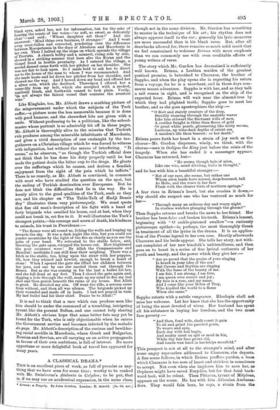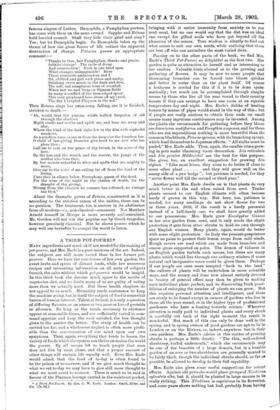A CLASSICAL DRAMA.* Trim is an excellent piece of work,
as full of promise as any- thing that we have seen for some time; worthy to be ranked with Mr. Swinburne's Atalanta in Calydon; to be put, that is, if we may use an academical expression, in the same class,
• Erten° : a Tragedy. By John Gurdon. London: E. Arnold. [Ss. 6d. net.]
though not in the same division. Mr. Gurdon has something to master in the technique of his art ; his rhythm does not always approve itself to the ear ; generally his lyric measures are more successful than is his blank verse. But, after all drawbacks allowed for, there remains so much solid merit that we feel constrained to welcome Erinna with more emphasis than we can commonly use with even creditable efforts of young writers of verse.
The story which Mr. Gurdon has dramatised is sufficiently well known. Erinna, a Lesbian maiden of the greatest poetical promise, is betrothed to Charaxus, the brother of Sappho, and when the play opens she is expecting his return from a voyage, for he is a merchant, and in those days com- merce meant adventure. Sappho is with her, and as they talk a sail comes in sight, and is recognised as the ship of the expected lover. Erinna will wait near the almond-tree by which they had plighted troth; Sappho goes to meet her brother, and as she goes apostrophises the ship :-
" 0 fleet and stately creature of the deep,
Steadily shearing through the unstable waves Like fate athwart the fluctuant wills of men, A costlier freight is thine than fleece of gold Or great white pearls, glimmering like misty moons, Lustrous, up wine-dark depths of orient sea. A maiden's life thou bearest : or her death."
Erinna pours forth her heart in a strain of joy such as the chorus—Mr. Gurdon dispenses, wisely, we think, with the
chorus—uses in Oedipus the King just before the crisis of the tragedy. When she has ended it a messenger appears.
Charaxus has returned, but— "He seems, though hale of mien, Like one who, mind dividing, halts in thought,"
and he has with him a beautiful stranger :— " Not of our race, she seems, but rather one Whom alien lands have nursed, deep-bosomed, tall. As Hebe, and the roses in her face Flush with the clearer tints of northern springs."
A fear rises in Erinna's heart, but she crushes it down,— why should she suspect one who has ventured so much for her- " Through many an arduous day and weary night In starless watches plunging through the gloom?"
Then Sappho returns and breaks the news to her friend. Her brother has been false and broken his troth. Erinna's lament, beginning with 0 sickle-pinioned swallow "—a curiously picturesque epithet—is, perhaps, the most thoroughly Greek in treatment of all the lyrics in the drama. It is an applica- tion of the Procne legend to her own case. Shortly afterwards
Charaxus and his bride appear. She tells her story, not with- out complaint of her new kinsfolk's unfriendliness, and then goes on to boast in a series of fine lyrical outbursts of her youth and beauty, and the power which they give her :—
"Are ye proud that the praise of your singing
Is heard in your isles of the sea?
But Cyrene and Scythia are ringing With the fame of the beauty of me.
I am fair, I am strong, I am free, I am queen over sorrow and joy ; My face is a rose, and my name.
And I come like your Helen of Troy, Who kindled the world to a flame
When she came."
Sappho retorts with a subtle vengeance. Rhodopis shall not
miss her welcome. Let her know that she has the opportunity of being the most devoted of wives. Her husband has spent
all his substance in buying her freedom, and the two must face poverty :— "And thou, fond wife, shalt count it gain
To sit and grind the parched grain, To weave and spin, Each day with toil begin, And scanty meat on spit or meal in bin, While thy fair face grows old, And hands wax hard in hardships manifold."
This prospect is not at all to the stranger's mind, and after some angry reproaches addressed to Charaxus, she departs. A fine scene follows, in which Erinna proffers pardon, a boon which Charaxus is too sore of heart and stricken in conscience to accept. Not even when she implores him to save her, as Orpheus might have saved Eurydice, but for that fatal back- ward look, will he relent. Then Pittacus, tyrant of Mitylene, appears on the scene. He has with him Athenian Ambassa- dors. They would fain hear, he says, a strain from the
famous singers of Lesbos. Damophila, a Pamphylian poetess, has come with them on the same errand. Sappho and Erinna hold hurried council. Shall they bide their grief and sing ? Yes ; but let Damophila begin. So Damophila takes up the theme of how the great forces of life outlast the apparent destruction of change. Pittacus passes an appropriate comment :—
" Thanks to thee, fair Pamphylian, thanks and praise.
Infinite change ! The cycle of decay And resurrection ! Even in one brief span What changes unimaginable ! Here These venerable ambassadors and I Sit, clothed and girt with peace and amity, Drinking sweet music in the dusk and dew, The soft, sad sumptuous hour of evenfall.
When last we met 'twas on Sigaean fields In many a conflict of the keen-edged spear.
This very greybeard here shore off my crest,
The day I tangled Phrynon in the net."
Then Erinna sings her swan-song, falling, ere it is finished, stricken to death :—
" Ah, would that the pinions which wafted Sarpedon of old through the shadows
Might cradle and soothe and uplift me, and bear me away and afar, Where the wind of the dark sighs low in the dim wide asphodel meadows,
As a windless wave swims in from the deep o'er the foamless bar. 0 child of law-giving Demeter give hoed to me now who im- plore thee ;
Lull me to rest on the peace of thy breast, in the arms of thy love.
By the loss and the search and the sorrow, the pangs of the mother who bore thee, By her secrets unlawful to utter and spells that are mighty to move, Give ear to the voice of me calling far off from the land of the living, Unto thee in silence below, Persephone, queen of the dead, For the wine of the night in the chalice of death, for the draught of thy giving, Wrung from the clusters no summer has softened, no vintage has bled."
About the dramatic power of Erinna, constructed as it is according to the strictest canon of the unities, there can be no question. The treatment, too, is austere in its abstinence from all modern—i.e., non-classical—ornament. Not Matthew Arnold himself in Merope is more severely self-restrained. Mr. Gurdon will not win the popular ear by Greek tragedies, however genuinely classical. But he shows powers which he may well use hereafter to compel the world to listen.











































 Previous page
Previous page